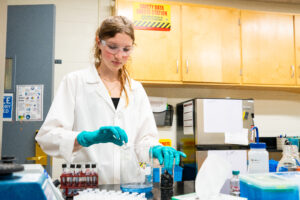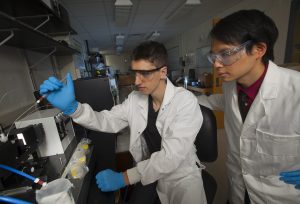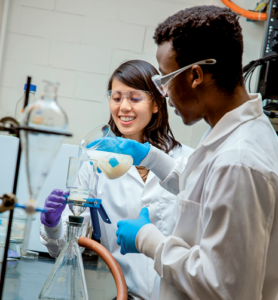Environment, Energy, and Sustainability
Chemical engineering is vital to the development of scalable and impactful solutions for the world’s most critical challenges in environment, energy, and sustainability. These research areas encompass the overall life cycle of natural and industrial processes, from sustainable sourcing to minimizing waste and impacts on humans and the environment. The breadth of expertise within Lafayette Chemical and Biomolecular Engineering spans water and atmospheric systems, fuels and biofuels, catalytic systems and designing greener processes.
Atmospheric Aerosol Property Lab
The chemistry that occurs within atmospheric aerosols, i.e., small particles or droplets in the atmosphere, is a major sticking point in current understanding of climate change mechanics. These aerosols can be directly emitted by natural and man-made sources, but can also form through complex chemistry that occurs in the gases of the atmosphere. While the climatological heating and cooling effects of many other atmospheric elements, such as greenhouse gases, have been estimated with reasonable certainty, the effect of aerosols remains poorly characterized and contributes to the largest source of inaccuracy to atmospheric models. Research at Lafayette aims to increase the understanding of the physical effects of several relevant atmospheric volatile organic compounds on aqueous atmospheric aerosols (clouds), including their light-absorbing properties and surface behaviors.
Computational Catalysis & Materials Design Lab
Computational modeling offers powerful tools to understand and predict how materials behave at the atomic scale. Our lab investigates surface chemistry, catalysis, and defect-driven reactivity using quantum mechanical calculations and data-driven approaches. Current research focuses on two main areas: studying oxygen vacancies on titanium oxide surfaces to understand how defects influence adsorption and catalytic behavior, and using machine learning and large materials databases to predict phase stability and surface properties of metal carbides. Together, these efforts aim to advance the design of materials for energy conversion, catalysis, and sustainable surface technologies.
Environmental Microbiology and Resource Recovery Lab (EMRRL)
 Our lab is at the forefront of innovative research aimed to transform waste streams into product streams. We harness the power of common bacteria to liberate bound phosphorus from wastewater treatment plant biosolids, with the goal of recovering it to use as a fertilizer. In conjunction with our phosphorus recovery efforts, we also focus on extracting polyhydroxyalkanoate (PHA) from the spent bacteria. PHA is a biodegradable polymer, produced in the cytoplasm of certain bacteria, that can serve as an eco-friendly alternative to conventional plastics. By converting waste biomass into this valuable polymer, we aim to promote sustainable biopolymer production that could significantly reduce plastic pollution.
Our lab is at the forefront of innovative research aimed to transform waste streams into product streams. We harness the power of common bacteria to liberate bound phosphorus from wastewater treatment plant biosolids, with the goal of recovering it to use as a fertilizer. In conjunction with our phosphorus recovery efforts, we also focus on extracting polyhydroxyalkanoate (PHA) from the spent bacteria. PHA is a biodegradable polymer, produced in the cytoplasm of certain bacteria, that can serve as an eco-friendly alternative to conventional plastics. By converting waste biomass into this valuable polymer, we aim to promote sustainable biopolymer production that could significantly reduce plastic pollution.
Fuel Properties Lab
Fuels can be derived from a number of different sources, ranging from petroleum to soybeans. However, in order for them to be usable in a wide variety of applications, the fuels must meet standards for properties such as energy content and viscosity. Current research focuses most particularly on cold flow properties, in other words, how a fuel will move at lower temperatures. Cold flow properties are particularly important in colder climates, where it is possible for the fuel to change phase from liquid to solid, potentially resulting in significant equipment damage. Research looks at these issues from both an experimental and computational viewpoint.
Green Engineering Lab
Green engineering principles play a key role in developing sustainable methods for creating chemicals and products. This approach holistically considers a product’s entire life cycle, from design to disposal, to minimize environmental, and economic impact. Current research at Lafayette focuses on creating greener processes for biomass- and waste-based feedstocks. Specifically, one set of projects explores the use of greener solvents (solvents with less inherent hazard), to improve the environmental impact of producing bio-based products such as biofuels and bio-based polymers. Other research involves the evaluation of waste as a feedstock for the extraction and production of critical materials such as gold, lithium, and cobalt.
Find out more at: Green Engineering Lab



